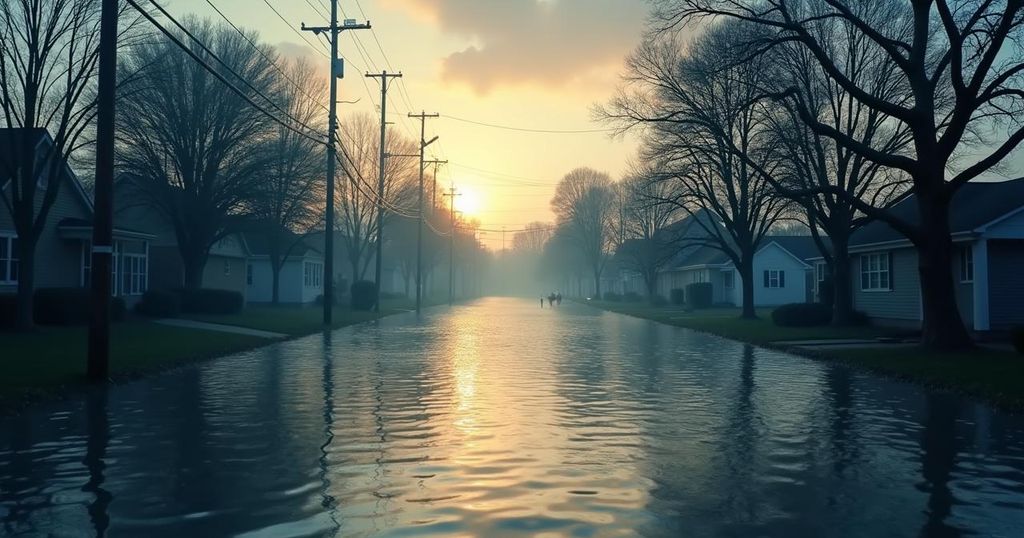Hurricane Helene Leaves a Trail of Destruction in North Carolina

Hurricane Helene devastated Western North Carolina, causing severe flooding, fatalities, and widespread power outages. As towns like Swannanoa experienced unprecedented flooding, emergency services worked tirelessly to assist those affected. With many individuals unaccounted for and significant infrastructure damage, recovery efforts are underway. President Biden has pledged federal resources to aid these struggling communities as they confront the aftermath of the storm.
In the aftermath of Hurricane Helene’s devastating impact, Western North Carolina towns have experienced severe flooding, reminiscent of historical natural disasters. Residents such as Beverly and Baxter Eller, who had not faced flooding in their 37-year residence in Swannanoa, found themselves displaced early Friday morning when floodwaters surged through their community. According to Beverly Eller, “We are just in survival mode,” highlighting the stark reality faced by many. The storm has inflicted significant damage across the region, lifting homes off their foundations and causing landslides that isolated several mountain communities. Avril Pinder, Buncombe County Manager, likened the situation to “Buncombe County’s own Hurricane Katrina.” The region has witnessed a tragic loss of life, with reports indicating at least 49 fatalities across several Southern states, including North Carolina, where seven lives were claimed. Taylor Jones, Director of Emergency Management in Buncombe County, warned of a potential rise in fatalities as emergency services faced overwhelming demand amid widespread power outages affecting over 700,000 residents. Emergency responders went into action, rescuing individuals from perilous conditions, while officials implemented a mass fatality plan to manage the situation. The situation worsened as meteorologists predicted continued flooding, with dam overflows prompting residents to seek elevated safety. Ryan Cole of Buncombe County referred to the flooding as “biblical devastation”. In shelters established for those displaced, families were seen grappling with the uncertainty of their loved ones’ safety. The emotional toll was evident, as seen in the case of Crystal Wilson, who struggled to comprehend her family’s situation due to communication breakdowns. Reports indicated that across the County, communication services remained disrupted, leaving as many as 60 individuals unaccounted for. As inquiries into the status of loved ones gained momentum on social media, Emergency Services urged individuals to refrain from calling emergency lines for non-critical concerns. President Biden ensured federal support for recovery efforts, emphasizing long-term assistance for impacted communities. With the storm continuing to pose flood risks even as it weakened into a post-tropical cyclone, officials remained steadfast in their efforts to coordinate recovery measures amid the ongoing crisis. Residents across the region rushed to aid one another while navigating the challenges of extensive damage—with reports of infrastructure destruction and essential services disrupted. The Ellers anxiously awaited news from their son while others shared similar concerns, illustrating the collective anxiety stemming from the hurricane’s wake. Reports from nearby areas, such as the catastrophic situation in Erwin, Tennessee—where a hospital faced a crisis as floodwaters rose—exemplified the widespread nature of Helene’s impact. As communities began to recover from the immediate threat, the long and arduous journey to restoration lay ahead.
In September 2024, Hurricane Helene made landfall in Florida and subsequently traveled north, wreaking havoc across the Southeastern United States, particularly focusing on North Carolina. The storm’s rapid intensification and subsequent weakening contributed to widespread devastation, primarily through flooding and associated fatalities. Key challenges included infrastructure damage, power outages, and the emotional toll of prolonged communication failures, making recovery efforts exceedingly complex. The storm’s impact drew comparisons to historic disasters, underscoring the severity of the situation.
In conclusion, Hurricane Helene has left a profound impact on the Southern communities, particularly in North Carolina, with extensive flooding and significant loss of life. As local, state, and federal entities mobilize for recovery, families continue to face uncertainty regarding the safety and status of their loved ones. The situation remains critical, demanding concerted efforts to restore services and support the displaced. Residents exemplify solidarity as they navigate the ramifications of this catastrophic event, while authorities strive to ensure the community’s path to recovery.
Original Source: www.washingtonpost.com




